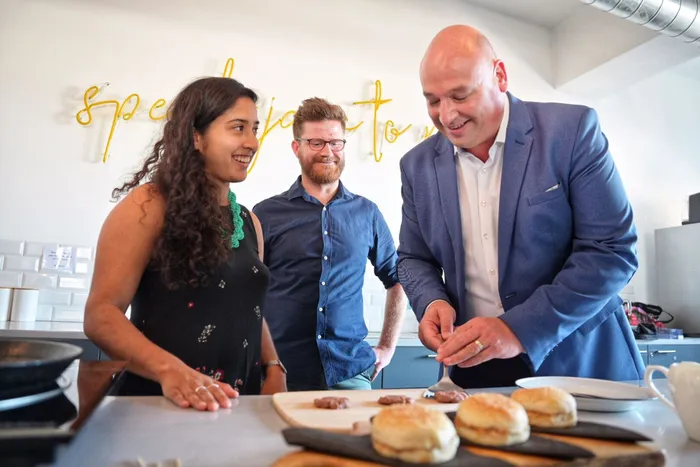Cape Town gets lab-grown beef burger

From left, are Mzansi Meat Company co-founders Tasneem Karodia and Brett Thompson with mayoral committee member for economic growth James Vos.
Capetonians will soon be able to eat burgers made from lab-grown beef thanks to a partnership between Woodstock companies Mzansi Meat Co. and BioCiTi.
Last week, mayoral committee member for economic growth James Vos got to taste the “cultivated beef” burger and gave his nod of approval.
The meat patty is the product of Mzansi Meat, a local start-up whose aim was to find a way to make healthier, more environmentally-friendly meat that tastes just as good as farm-reared livestock.
Co-founder and chief financial officer Tasneem Karodia said the burger’s journey began at Mzansi Meat’s local farm animal sanctuary where veterinarians removed tiny tissue cells from free-roaming animals.
“Once the cells are harvested, a sample is taken to the Mzansi Meat lab where they isolate the cells and grow them in a culture medium, a special type of food containing vitamins, salts and proteins that the cells need to develop and divide. Once they have enough cells, they place them on an edible structure and after adding a few additional flavours, the cultivated meat is ready to be served.”
They partnered with biotechnology business incubator BioCiTi, a non-profit company, to have access to lab facilities.
Ms Karodia said they were replicating what happened inside an animal’s body. “A cultivated-beef burger is then simply a beef burger that has had cultivated-beef cells grown in sterile conditions outside of the cow.”
Their initial beef burger was a blend of cultivated meat and plant-based protein.
“We will now work on optimising our processes and scale our production. Once we have optimised our bovine (beef burger) cell line, we will start focusing on expanding our portfolio of species. Currently we have lamb, chicken and pork cell lines in development but not yet on par with our bovine cell line development. We then aim to expand our current meatball/burger product formats to include sausages, nuggets, and crumbed-based meat cuts,” Ms Karodia said.
Mr Vos said Cape Town start-ups such as Mzansi Meat were creating products that were having a meaningful impact on people’s lives.
“It gives me great pride that the City forms part of the network of support for these entrepreneurs.”
Ms Karodia said they hoped to tackle hunger in Africa by offering alternative solutions to conventional agriculture.
“That's not to say we don’t want to work alongside the conventional meat industry because that’s something we will do. In order to keep up with demand, we need solutions, and that’s what inspires us to make meat in Africa,” she said.
BioCiTi was founded in 2019 to enable the growth of biotechnology start-ups. Cluster head Dheepak Maharajh said they made it possible for start-ups like Mzansi to access world-class laboratory infrastructure that would otherwise be out of their reach.
Mr Vos said BioCiTi, was helping to produce industries of the future.
“It is platforms such as these that have helped Cape Town gain a reputation as Africa’s start-up capital. Cape Town is home to 38% of South Africa’s IT developers, the highest concentration of these in the country,” he said.